KTH Welcomes its 2016 Delegation to Palestine
Commencing the Journey in Amman, Jordan
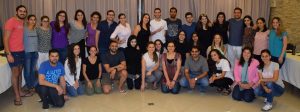 The 6th Annual Know Thy Heritage Leadership Program to “Explore & Live Palestine” officially began on Friday, July 8th as Palestinian young professionals from 6 countries and 5 continents gathered in Jordan before embarking on their journey to their homeland. Sir Rateb Rabie, who has been leading the journey for 6 years, welcomed the delegation during a morning orientation. Following the orientation, the delegates convened for a workshop with head of the Palestine International Institute and member of the Palestinian National Council, Dr. Asad Abdul Rahman, who discussed the conditions of Palestinians living under occupation. The delegates also explored various historical and religious sites in Amman including the Temple of Hercules, the Byzantine Church, the Islamic Ummayad Palace, Saint George’s Greek Orthodox Church, Amman’s iconic hilltop “Citadel,” and the ancient Roman Theatre. The previous Minister of Culture, H.E. Jeries Samawi, hosted the delegates for a cultural event in the Christian neighborhood of Fuheis, where delegates got a taste of Jordanian hospitality. H.E. Wageeh Azayzeh, Deputy Chair of the Jordanian Parliament’s Senate, invited them to share a traditional dinner of mansaf and kanafeh. After a delicious meal and lively conversation, the delegation joined the Fuheis Youth Group for some traditional Jordanian Dabkeh.
The 6th Annual Know Thy Heritage Leadership Program to “Explore & Live Palestine” officially began on Friday, July 8th as Palestinian young professionals from 6 countries and 5 continents gathered in Jordan before embarking on their journey to their homeland. Sir Rateb Rabie, who has been leading the journey for 6 years, welcomed the delegation during a morning orientation. Following the orientation, the delegates convened for a workshop with head of the Palestine International Institute and member of the Palestinian National Council, Dr. Asad Abdul Rahman, who discussed the conditions of Palestinians living under occupation. The delegates also explored various historical and religious sites in Amman including the Temple of Hercules, the Byzantine Church, the Islamic Ummayad Palace, Saint George’s Greek Orthodox Church, Amman’s iconic hilltop “Citadel,” and the ancient Roman Theatre. The previous Minister of Culture, H.E. Jeries Samawi, hosted the delegates for a cultural event in the Christian neighborhood of Fuheis, where delegates got a taste of Jordanian hospitality. H.E. Wageeh Azayzeh, Deputy Chair of the Jordanian Parliament’s Senate, invited them to share a traditional dinner of mansaf and kanafeh. After a delicious meal and lively conversation, the delegation joined the Fuheis Youth Group for some traditional Jordanian Dabkeh.
National Welcoming Ceremony for the Diaspora Homecoming in Bethlehem
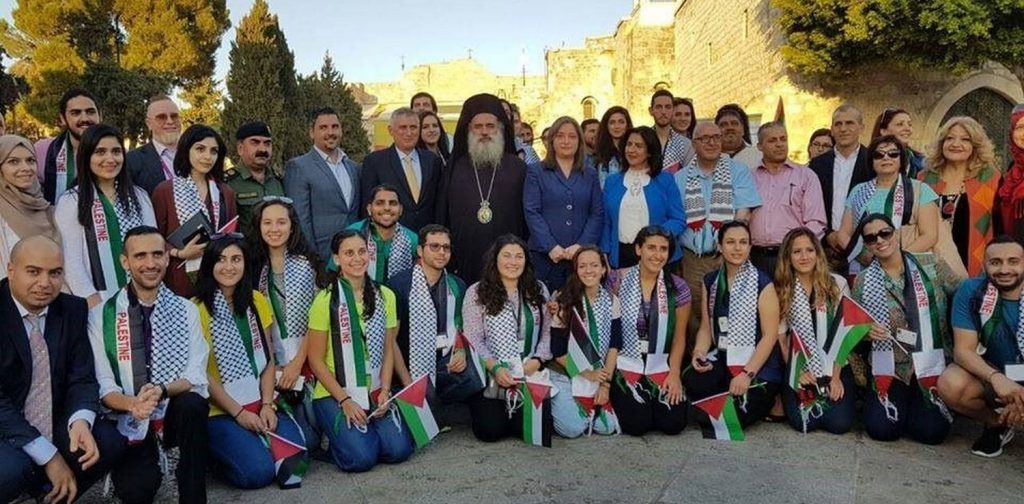 After an arduous 8-hour journey crossing the King Hussein Bridge, the delegation was welcomed by the city of Bethlehem in an emotional ceremony. Local scout troops, with a marching band in tow, accompanied the delegates as they made their way down Star Street to Manger Square, waving the Palestinian flag and greeting onlookers who lined the streets. The delegates were welcomed by the kind words of H.E. Rula Ma’ayah, Minister of Tourism and Antiquities, a representative of the Governorate of Bethlehem, H.E. Vera Baboun, Mayor of Bethlehem, His Eminence the Most Reverend Archbishop “Atallah” Hanna, Archbishop of Sebastia, Greek Orthodox Patriarchate of Jerusalem, and HCEF President and CEO, Sir Rateb Rabie. The delegates were overwhelmed with wonderment, gratitude, and emotion as many of them walked the streets of their homeland for the first time.
After an arduous 8-hour journey crossing the King Hussein Bridge, the delegation was welcomed by the city of Bethlehem in an emotional ceremony. Local scout troops, with a marching band in tow, accompanied the delegates as they made their way down Star Street to Manger Square, waving the Palestinian flag and greeting onlookers who lined the streets. The delegates were welcomed by the kind words of H.E. Rula Ma’ayah, Minister of Tourism and Antiquities, a representative of the Governorate of Bethlehem, H.E. Vera Baboun, Mayor of Bethlehem, His Eminence the Most Reverend Archbishop “Atallah” Hanna, Archbishop of Sebastia, Greek Orthodox Patriarchate of Jerusalem, and HCEF President and CEO, Sir Rateb Rabie. The delegates were overwhelmed with wonderment, gratitude, and emotion as many of them walked the streets of their homeland for the first time.
Exploring Bethlehem’s Religious History
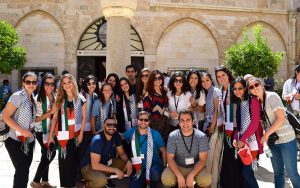 Home to many significant religious sites, Bethlehem was among the first Palestinian destinations to be explored. The journey began with a visit to the Church of the Nativity, the place of Christ’s birth, which took the group back in time with its mosaic floor and ancient inscriptions. Subsequently, they visited Milk Grotto Church where they heard the story of Jesus’ family hiding from Herod’s soldiers. Christian and Muslim women alike often visit this site to ask for the intercession of Mary, whose spilt breast milk is thought to have turned the Church’s stone walls white. The delegates then visited the oldest mosque in Bethlehem, the Mosque of Omar, where Omar Al-Khattab, one of the most influential Muslim caliphs in history, visited and prayed. The final destination was Shepherds’ Field in Beit Sahour, identified as the place where shepherds saw the Star of the Nativity. On the journey, the delegates caught a glimpse of the wall, which separates Bethlehem from Jerusalem. Despite the bittersweet experience of witnessing the holy sites and the occupation simultaneously, the group returned with a deeper understanding of their home, faith, and heritage.
Home to many significant religious sites, Bethlehem was among the first Palestinian destinations to be explored. The journey began with a visit to the Church of the Nativity, the place of Christ’s birth, which took the group back in time with its mosaic floor and ancient inscriptions. Subsequently, they visited Milk Grotto Church where they heard the story of Jesus’ family hiding from Herod’s soldiers. Christian and Muslim women alike often visit this site to ask for the intercession of Mary, whose spilt breast milk is thought to have turned the Church’s stone walls white. The delegates then visited the oldest mosque in Bethlehem, the Mosque of Omar, where Omar Al-Khattab, one of the most influential Muslim caliphs in history, visited and prayed. The final destination was Shepherds’ Field in Beit Sahour, identified as the place where shepherds saw the Star of the Nativity. On the journey, the delegates caught a glimpse of the wall, which separates Bethlehem from Jerusalem. Despite the bittersweet experience of witnessing the holy sites and the occupation simultaneously, the group returned with a deeper understanding of their home, faith, and heritage.
Educational Tour of Bethlehem Governorate
During their educational tour of Bethlehem, the delegates visited prominent local institutions working for the greater good of Bethlehem and its people. Among them were: the Bethlehem Development Foundation Showcase, which promotes the Foundation’s work to realize the full potential of the Bethlehem Governorate by carrying out projects that contribute to a thriving Palestinian economy and social environment; Bethlehem Business Incubator (BBI), a project sponsored by the U.S. Dept. of State and in partnership with Bethlehem University and Indiana University, which serves as a hub to incubate, mentor and support local entrepreneurs in the non-ICT sectors; and Bank of Palestine’s (BoP) Bethlehem headquarters, where delegates learned about the Bank’s local and international efforts to strengthen the economy. During their visit, the BoP Bethlehem Branch introduced delegates to the bank’s “Diaspora Unit,” which was established to facilitate communications with Palestinians in the diaspora and to help them invest in their homeland. The delegates also had the opportunity to tour BoP’s Gallery which highlights local Palestinian artists and is curated by art collector, Mr. George Lama.
Experiencing the Reality of Occupation at Aida Refugee Camp
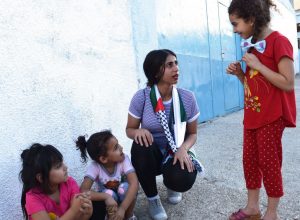 For 68 years, Aida Refugee Camp has served as a safe haven for Palestinians whose land was taken during the Nakba in 1948. During their visit to the Camp, the delegates heard a presentation on the camp’s current conditions by the Lajee Center, a refugee-run non-profit organization. The camp was intended to be temporary, but due to persisting occupation the refugees have continued to take shelter there. Unfortunately the camp has not grown along with the refugee population, and is severely overcrowded. During their tour, the delegates heard the stories behind the artwork and graffiti that covered its surface. Hearing stories of injustice, witnessing the memorial walls, and interacting with children who face the daily challenges of occupation were distressing experiences that motivated the delegates to take action.
For 68 years, Aida Refugee Camp has served as a safe haven for Palestinians whose land was taken during the Nakba in 1948. During their visit to the Camp, the delegates heard a presentation on the camp’s current conditions by the Lajee Center, a refugee-run non-profit organization. The camp was intended to be temporary, but due to persisting occupation the refugees have continued to take shelter there. Unfortunately the camp has not grown along with the refugee population, and is severely overcrowded. During their tour, the delegates heard the stories behind the artwork and graffiti that covered its surface. Hearing stories of injustice, witnessing the memorial walls, and interacting with children who face the daily challenges of occupation were distressing experiences that motivated the delegates to take action.
Embracing Heritage at Yabous Cultural Center
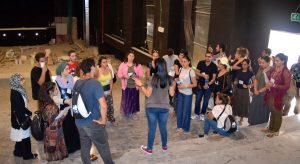 The Yabous Cultural Center was founded in 1995 to stimulate and expand the creativity and diversity of Palestinian artistic expression. The Center is run by a team of resilient individuals who have dedicated their lives to preserving culture through performing arts. It serves as the largest cultural center in Jerusalem, providing a place where people can come together and share in a wide array of activities in order to preserve and promote Palestinian culture and art. Director Raina Elias expressed her enthusiasm for the organization as well as her grief for the obstacles it faces on a daily basis. She expressed, “In order to live normally we have to use our only weapon, which is our culture.” The delegates were encouraged by her tenacious efforts to resist the destruction of Palestinian culture.
The Yabous Cultural Center was founded in 1995 to stimulate and expand the creativity and diversity of Palestinian artistic expression. The Center is run by a team of resilient individuals who have dedicated their lives to preserving culture through performing arts. It serves as the largest cultural center in Jerusalem, providing a place where people can come together and share in a wide array of activities in order to preserve and promote Palestinian culture and art. Director Raina Elias expressed her enthusiasm for the organization as well as her grief for the obstacles it faces on a daily basis. She expressed, “In order to live normally we have to use our only weapon, which is our culture.” The delegates were encouraged by her tenacious efforts to resist the destruction of Palestinian culture.
Reflecting on the Past & Present of Palestinian Leadership at Yasser Arafat’s Tomb
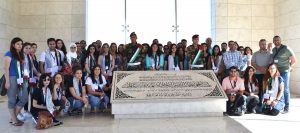 The delegate’s trip to Ramallah played a monumental role in cultivating an understanding of Palestinian culture and politics. During the visit to Yasser Arafat’s Tomb, the delegation heard a the history of Arafat’s life and of his attempts to create lasting peace for the Palestinian people.
The delegate’s trip to Ramallah played a monumental role in cultivating an understanding of Palestinian culture and politics. During the visit to Yasser Arafat’s Tomb, the delegation heard a the history of Arafat’s life and of his attempts to create lasting peace for the Palestinian people.
–
Appreciating Poetry & Heritage at the Mahmoud Darwish Museum
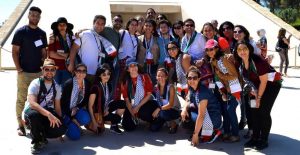 Also while in Ramallah, the delegates visited the Mahmoud Darwish Foundation Museum, where they explored the outdoor garden theater and exhibits of the world-renowned poet’s belongings and manuscripts. The Foundation seeks to disseminate Darwish’s accomplishments as widely as possible and to shed a light on the richness of his poetry, which included themes of love for Palestine, human dignity, and the value of life. The visit concluded with a lunch hosted by H.E. Dr. Laila Ghannam, Governor of Ramallah & Al Bireh Governorate and the first female governor in Palestine.
Also while in Ramallah, the delegates visited the Mahmoud Darwish Foundation Museum, where they explored the outdoor garden theater and exhibits of the world-renowned poet’s belongings and manuscripts. The Foundation seeks to disseminate Darwish’s accomplishments as widely as possible and to shed a light on the richness of his poetry, which included themes of love for Palestine, human dignity, and the value of life. The visit concluded with a lunch hosted by H.E. Dr. Laila Ghannam, Governor of Ramallah & Al Bireh Governorate and the first female governor in Palestine.
Understanding the Geo-Politics of Palestine at the Applied Research Institute
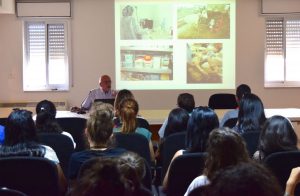 One of the most informative events attended by the 2016 delegation was the meeting with the Applied Research Institute in Jerusalem (ARIJ). During the event the delegates grasped a thorough understanding of the geo-political and economic situation in Palestine. The institute was founded in 1990 to promote sustainable development in the occupied Palestinian territories and to support the self-reliance of the Palestinian people through control of their natural resources. One major point of discussion was their Natural Resource Management Program, which aims to assess alternative options, policies, and strategies to conserve natural resources. The delegates got an inside look into how they, as diaspora, can take part in preserving Palestine.
One of the most informative events attended by the 2016 delegation was the meeting with the Applied Research Institute in Jerusalem (ARIJ). During the event the delegates grasped a thorough understanding of the geo-political and economic situation in Palestine. The institute was founded in 1990 to promote sustainable development in the occupied Palestinian territories and to support the self-reliance of the Palestinian people through control of their natural resources. One major point of discussion was their Natural Resource Management Program, which aims to assess alternative options, policies, and strategies to conserve natural resources. The delegates got an inside look into how they, as diaspora, can take part in preserving Palestine.
Initiating Economic Change at the Bank of Palestine
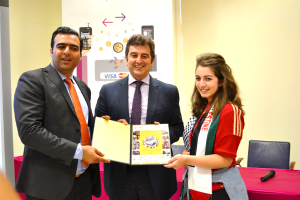 The delegation met with the Bank of Palestine to discuss initiatives and opportunities for fostering economic growth in the region. The Bank of Palestine was founded in 1960 to help provide financial services in Palestine, but has since become one of the most important forces behind economic progress. Despite the extreme restrictions placed upon the Palestinian economy, Bank of Palestine has been able to steadily grow and, most importantly, to invest back into the economy by donating allocations of annual income to social and cultural initiatives. The delegates were enthused by the bank’s presentation of the diaspora unit, as they learned ways in which they can collaborate internationally with the bank and its projects. Additionally, the delegates had the opportunity to discuss ideas one-on-one with representatives from the bank. Meeting with the Bank of Palestine encouraged the delegates to think more broadly about how to participate in the Palestinian struggle. They were hopeful about the practical initiatives given to them in order to strengthen Palestine through business and investment.
The delegation met with the Bank of Palestine to discuss initiatives and opportunities for fostering economic growth in the region. The Bank of Palestine was founded in 1960 to help provide financial services in Palestine, but has since become one of the most important forces behind economic progress. Despite the extreme restrictions placed upon the Palestinian economy, Bank of Palestine has been able to steadily grow and, most importantly, to invest back into the economy by donating allocations of annual income to social and cultural initiatives. The delegates were enthused by the bank’s presentation of the diaspora unit, as they learned ways in which they can collaborate internationally with the bank and its projects. Additionally, the delegates had the opportunity to discuss ideas one-on-one with representatives from the bank. Meeting with the Bank of Palestine encouraged the delegates to think more broadly about how to participate in the Palestinian struggle. They were hopeful about the practical initiatives given to them in order to strengthen Palestine through business and investment.
A Journey Highlight: Immersing in Palestinian Life and Culture During Homestays
In order to fully experience the richness of Palestinian culture, the delegates each spent two days with a host family through KTH’s homestay program. Some met their hosts for the first time, while others reunited with their families after many years. The homestay provided the delegates with the unique opportunity to experience Palestinian culture first-hand and to intimately acquaint themselves with everyday life in Palestine. This was a great opportunity for the delegates to connect with their roots while building life-long relationships.
“My homestay allowed me to experience a traditional Bedouin wedding in Hebron, as well as a traditional Muslim wedding in the Bethlehem district. In addition to all of the incredible weddings, I managed to visit the rock plant and farm where my host family works.” –Anwar D, Colombia
“I never would have thought I would be walking on the same streets as my grandfather.” – Raimundo M, Chile
Learning From Entrepreneurs and Innovators at the Ibtikar Fund
With Palestinian businesses becoming one of the primary focuses of the delegation, the group met with representatives from the Ibtikar Fund, a fund that invests in innovative Palestinian companies at their earliest stages. During this visit, the delegates learned about the many successful companies that have benefited from investment. They also enjoyed hearing from Peter Abualzolof, a Palestinian Entrepreneur who left the U.S to start a business called Mashvisor in Palestine. He encouraged the delegates to be resourceful and shameless, not to be afraid of believing in a cause and taking risks.
“It was encouraging to hear how the Ibtikar fund is willing to go out of their comfort zones when investing in companies. They look for innovative ideas and take risks on a daily basis for the betterment of Palestinians.” – Hannah S, U.S.
Visiting the Bethlehem Museum
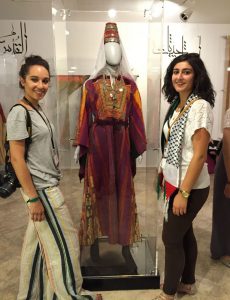 The Bethlehem Museum is dedicated to fostering a deeper understanding and appreciation for the role Palestinian Arab Christians play in preserving Palestinian heritage, identity, and culture. While visiting the museum, the delegates explored ancient Canaanite artifacts, a Roman aqueduct, traditional Palestinian embroidery, Byzantine icons, Mother of Pearl crafts, olive woodcarvings, oil paintings, and a more contemporary collection of artifacts from the diaspora. The artifacts and exhibits display the rich history of Palestine and highlight the integral role of the diaspora in Palestinian society. The delegates left with a deeper understanding of their Palestinian culture and the important role Christians have played in preserving it.
The Bethlehem Museum is dedicated to fostering a deeper understanding and appreciation for the role Palestinian Arab Christians play in preserving Palestinian heritage, identity, and culture. While visiting the museum, the delegates explored ancient Canaanite artifacts, a Roman aqueduct, traditional Palestinian embroidery, Byzantine icons, Mother of Pearl crafts, olive woodcarvings, oil paintings, and a more contemporary collection of artifacts from the diaspora. The artifacts and exhibits display the rich history of Palestine and highlight the integral role of the diaspora in Palestinian society. The delegates left with a deeper understanding of their Palestinian culture and the important role Christians have played in preserving it.
Uniting the Young & the Young at heart at HCEF’s Birzeit Senior Citizen Center
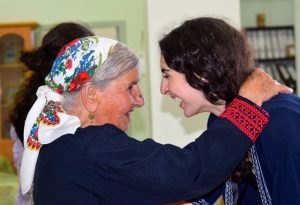 The delegation stopped by the Birzeit Senior Citizen Center (BSCC), where the elders and delegates spent an afternoon in fellowship over food, dance, and laughter. BSCC is a center run by HCEF that provides the senior community in Birzeit with both spiritual and physical enrichment. Spending time with the BSCC elders was a special opportunity for the delegates, as they were able to learn a great deal from their wisdom, stories and experience. Also while at BSCC, the delegates and elders heard a presentation by the Mahmoud Abbas Foundation about their work, which seeks to support Palestinians living in harsh conditions in camps and in the diaspora. Following a delicious meal prepared by BSCC, the Al-Funoun Dance Troupe arrived to teach the group traditional Dabkeh as well as various other traditional Palestinian dances. The delegates danced hand in hand as one unit, stomping to the beat that their ancestors created to tell stories and celebrate culture. After their visit to Birzeit, the delegation visited Rawabi, the first planned city in Palestine, and learned about their project to bolster the Palestinian economy by generating new, long-term jobs. In Ramallah, the delegation also met with HE Dr. Tayseer Jaradat, Deputy Minister of Foreign Affairs, to learn about how the diaspora can get involved in building Palestine.
The delegation stopped by the Birzeit Senior Citizen Center (BSCC), where the elders and delegates spent an afternoon in fellowship over food, dance, and laughter. BSCC is a center run by HCEF that provides the senior community in Birzeit with both spiritual and physical enrichment. Spending time with the BSCC elders was a special opportunity for the delegates, as they were able to learn a great deal from their wisdom, stories and experience. Also while at BSCC, the delegates and elders heard a presentation by the Mahmoud Abbas Foundation about their work, which seeks to support Palestinians living in harsh conditions in camps and in the diaspora. Following a delicious meal prepared by BSCC, the Al-Funoun Dance Troupe arrived to teach the group traditional Dabkeh as well as various other traditional Palestinian dances. The delegates danced hand in hand as one unit, stomping to the beat that their ancestors created to tell stories and celebrate culture. After their visit to Birzeit, the delegation visited Rawabi, the first planned city in Palestine, and learned about their project to bolster the Palestinian economy by generating new, long-term jobs. In Ramallah, the delegation also met with HE Dr. Tayseer Jaradat, Deputy Minister of Foreign Affairs, to learn about how the diaspora can get involved in building Palestine.
Experiencing the History and Hardship of Jericho
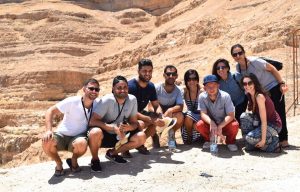 On their way to Jericho, the delegates stopped in Abu Dis to visit the Abu Jihad Museum for Prisoner Movement. While there, they got an inside look at the harsh reality of occupation prisons. The museum contains a devastating collection of art, poetry, manuscripts, and journals from political prisoners held by the Israeli government, often without due process. In Jericho, the delegates were given a comprehensive tour, courtesy of the Ministry of Tourism and Antiquities. During their tour, they climbed the Mount of Temptation, visiting the small church that resides at the top, marking the spot where the devil tempted Jesus after his 40 day fast. They also visited the Sycamore Tree, believed to be the tree Zacchaeus climbed to better watch Jesus walking through a crowded throng. The excursion in Jericho concluded with a visit to Hisham Palace, and a tour of Tel As-Sultan, an ancient town near Jericho believed to be among the oldest cities in the world. There, they toured the archaeological projects which are helping to preserve Jericho’s cultural heritage. The tour culminated in their arrival at the famous Jericho Gate, from where they left to spend the rest of their day relaxing at the Dead Sea.
On their way to Jericho, the delegates stopped in Abu Dis to visit the Abu Jihad Museum for Prisoner Movement. While there, they got an inside look at the harsh reality of occupation prisons. The museum contains a devastating collection of art, poetry, manuscripts, and journals from political prisoners held by the Israeli government, often without due process. In Jericho, the delegates were given a comprehensive tour, courtesy of the Ministry of Tourism and Antiquities. During their tour, they climbed the Mount of Temptation, visiting the small church that resides at the top, marking the spot where the devil tempted Jesus after his 40 day fast. They also visited the Sycamore Tree, believed to be the tree Zacchaeus climbed to better watch Jesus walking through a crowded throng. The excursion in Jericho concluded with a visit to Hisham Palace, and a tour of Tel As-Sultan, an ancient town near Jericho believed to be among the oldest cities in the world. There, they toured the archaeological projects which are helping to preserve Jericho’s cultural heritage. The tour culminated in their arrival at the famous Jericho Gate, from where they left to spend the rest of their day relaxing at the Dead Sea.
Exploring Industry & Government in Hebron
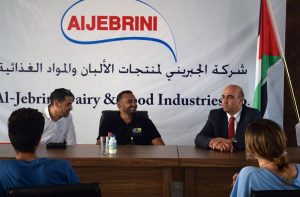 Home of the final resting place of Abraham, the forefather of the three Abrahamic faiths, Hebron remains the largest city in the West Bank with great religious significance to Muslims, Christians, and Jews. While visiting Hebron, the delegation toured the Ibrahimi Mosque, which marks the site where Abraham and his family are buried. Following the tour, the delegates met with HE Kamal Hemeid, Governor of Hebron, and enjoyed a lunch hosted by the governorate. While visiting Hebron’s Chamber of Commerce, the delegates learned about local production and the vital role it plays in the West Bank economy. Despite the fact that Hebron accounts for a third of the West Bank’s GDP, many local manufacturers face great difficulties because of the economic restrictions imposed upon them by the occupation. After learning about Hebron’s important manufacturing market, they were able to tour various workshops themselves, where they learned about how locals have preserved their artisanal traditions over the course of history. These tours included a visit to Hirbawi Textiles Factory, the last operating Palestinian factory producing the iconic Keffiyyeh, and to Al-Jebrini Dairy Factory.
Home of the final resting place of Abraham, the forefather of the three Abrahamic faiths, Hebron remains the largest city in the West Bank with great religious significance to Muslims, Christians, and Jews. While visiting Hebron, the delegation toured the Ibrahimi Mosque, which marks the site where Abraham and his family are buried. Following the tour, the delegates met with HE Kamal Hemeid, Governor of Hebron, and enjoyed a lunch hosted by the governorate. While visiting Hebron’s Chamber of Commerce, the delegates learned about local production and the vital role it plays in the West Bank economy. Despite the fact that Hebron accounts for a third of the West Bank’s GDP, many local manufacturers face great difficulties because of the economic restrictions imposed upon them by the occupation. After learning about Hebron’s important manufacturing market, they were able to tour various workshops themselves, where they learned about how locals have preserved their artisanal traditions over the course of history. These tours included a visit to Hirbawi Textiles Factory, the last operating Palestinian factory producing the iconic Keffiyyeh, and to Al-Jebrini Dairy Factory.
“I really enjoyed touring the dairy factory. It was encouraging to see Palestinians manage to compete and thrive in the business world despite their hardships.” — Kamil M, Chile
Engaging in Sustainable Education Dialogue at the Ministry of Higher Education
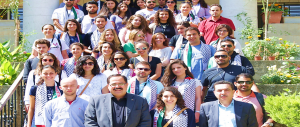 In Ramallah, H.E. Dr. Sabri Saidam, Minister of Education & Higher Education, spoke with the delegation about the vital role of schools and universities in Palestine. The Ministry of Education & Higher Education is charged with managing public schools as well as Palestinian universities and community colleges. They strive to build an accessible, diverse, and sustainable education system. Dr. Saidam spoke about the challenges the school systems face, and about how, despite these challenges, they are becoming flourishing centers of learning. The delegates were enthusiastic about the energy and optimism of the Palestinian student body.
In Ramallah, H.E. Dr. Sabri Saidam, Minister of Education & Higher Education, spoke with the delegation about the vital role of schools and universities in Palestine. The Ministry of Education & Higher Education is charged with managing public schools as well as Palestinian universities and community colleges. They strive to build an accessible, diverse, and sustainable education system. Dr. Saidam spoke about the challenges the school systems face, and about how, despite these challenges, they are becoming flourishing centers of learning. The delegates were enthusiastic about the energy and optimism of the Palestinian student body.
“Today I realized the importance of enforcing the idea of hope and innovation in schools. The students here live through the struggles on the land and it motivates them enough to want to make a difference.” — Amanda B, U.S.
Fostering Peace and Coexistence at the Religious Leaders Meeting
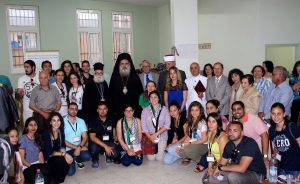 The delegation attended an interfaith discussion with three major religious leaders of the Palestinian Community: Archbishop Theodosis ‘Atallah’ Hanna of Sebastia representing the Orthodox Church of Jerusalem, Sheikh Mohammed Saeed Salah, General Mufti of the Palestinian Security Forces, and Father Louis Hazboun, the parish priest of the Latin Church in Birzeit. The interfaith discussion centered on how the coexistence between Muslims and Christians in Palestine can serve as a model on a global scale. Archbishop ‘Atallah’ Hanna remarked, “We all have our Palestinian identity, regardless of our religion.”
The delegation attended an interfaith discussion with three major religious leaders of the Palestinian Community: Archbishop Theodosis ‘Atallah’ Hanna of Sebastia representing the Orthodox Church of Jerusalem, Sheikh Mohammed Saeed Salah, General Mufti of the Palestinian Security Forces, and Father Louis Hazboun, the parish priest of the Latin Church in Birzeit. The interfaith discussion centered on how the coexistence between Muslims and Christians in Palestine can serve as a model on a global scale. Archbishop ‘Atallah’ Hanna remarked, “We all have our Palestinian identity, regardless of our religion.”
Exploring the Samaritan History of Nablus
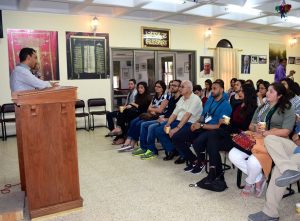 In Nablus, the delegates enjoyed a tour organized by the Nablus Governorate. At the Samaritan Museum, they learned about the Samaritans’ effort to preserve their dwindling community, which has existed there for over 2,500 years. With roughly 300 members living on Mt. Gerizim, the community continues to live under military occupation near an Israeli settlement. The delegates met with local community members and toured various religious sites, where they learned about the promise and the challenges of living in the region. Among these sites was Jacobs well, which is believed to be the location of Jesus’ encounter with the Samaritan woman. The delegates had the opportunity to drink from the “living water” as well as test the depths of the 40-meter well. The delegates later joined the Nablus Governorate for lunch where they conversed with HE Akram Rajoub, Governor of Nablus, and enjoyed traditional Nablus Knafeh. The governor encouraged the delegates to keep their passion and creativity burning as they continue on in their various walks of life.
In Nablus, the delegates enjoyed a tour organized by the Nablus Governorate. At the Samaritan Museum, they learned about the Samaritans’ effort to preserve their dwindling community, which has existed there for over 2,500 years. With roughly 300 members living on Mt. Gerizim, the community continues to live under military occupation near an Israeli settlement. The delegates met with local community members and toured various religious sites, where they learned about the promise and the challenges of living in the region. Among these sites was Jacobs well, which is believed to be the location of Jesus’ encounter with the Samaritan woman. The delegates had the opportunity to drink from the “living water” as well as test the depths of the 40-meter well. The delegates later joined the Nablus Governorate for lunch where they conversed with HE Akram Rajoub, Governor of Nablus, and enjoyed traditional Nablus Knafeh. The governor encouraged the delegates to keep their passion and creativity burning as they continue on in their various walks of life.
Understanding the Refugees Crisis in Jenin
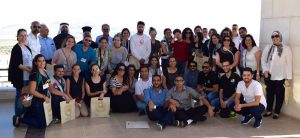 Upon arrival in Jenin, the northernmost city in the West Bank, the delegates joined the Ta’ayush Foundation for a tour of Al Zababdeh, where they learned about the history of the city and the ongoing refugee crisis. The Jenin refugee camp, established in 1953, is home to over 16,000 refugees and has remained an important site of Palestinian resistance. The Ta’ayush Foundation is a coalition of Palestinian youth who seek to counter poverty, unemployment, and intellectual stagnation in Palestine and to promote religious and political coexistence. The founder expressed the need for a solid educational foundation in Palestine: “The American University is the best educational project Palestine has seen. The unity between Palestine, Israel, and the diaspora intertwines us socially, economically, emotionally.” He encouraged the delegates to stay positive, and to draw inspiration from their challenges to help build Palestine. The visit to the Foundation was a highlight for the delegates, as they were eager to learn how the university produced such high quality educational programs despite the constraints of living under occupation. In the evening, the delegation dined with a delegation from the Jenin Governorate.
Upon arrival in Jenin, the northernmost city in the West Bank, the delegates joined the Ta’ayush Foundation for a tour of Al Zababdeh, where they learned about the history of the city and the ongoing refugee crisis. The Jenin refugee camp, established in 1953, is home to over 16,000 refugees and has remained an important site of Palestinian resistance. The Ta’ayush Foundation is a coalition of Palestinian youth who seek to counter poverty, unemployment, and intellectual stagnation in Palestine and to promote religious and political coexistence. The founder expressed the need for a solid educational foundation in Palestine: “The American University is the best educational project Palestine has seen. The unity between Palestine, Israel, and the diaspora intertwines us socially, economically, emotionally.” He encouraged the delegates to stay positive, and to draw inspiration from their challenges to help build Palestine. The visit to the Foundation was a highlight for the delegates, as they were eager to learn how the university produced such high quality educational programs despite the constraints of living under occupation. In the evening, the delegation dined with a delegation from the Jenin Governorate.
Exploring the Historic Villages and Stories of Iqrit & Burqin
Among the hundreds of Palestinian villages that were evacuated between 1947 and 1951, Iqrit is one whose descendants are coming close to fulfilling their return. The village sits atop a hill in the Western Galilee, just a few kilometers south of the Lebanese border. The church and cemetery were the only parts of the village left unscathed by the 1948 destruction. The delegates spent time talking with Iqritians from who shared the story of their village’s destruction and their ongoing struggle to maintain their land. The delegates were in awe of the inhabitants and their descendants who never gave up on their dream of returning home. Exploring the tiny historic town of Burqin was equally exciting, as it contained sites associated with Jesus’ ministry—the Church of Burqin is the oldest church in all of Palestine as well as the traditional site where Christ healed the ten lepers. It was a truly wondrous site to behold, and even more so, to ponder how the local Christians in Burqin have preserved the church for over 1800 years since its construction.
“I think the people who have lived and stayed on the property are amazing. They are very inspired by their land and their story, and in return they inspire others.” — Aya A, U.S.
Exploring the Historic Streets of Nazareth
The final day in the north began with a walk down the historic streets of Nazareth. Located in a valley in the lower Galilee, Nazareth is one of the most important religious sites in all of Palestine, as it is the city where Jesus spent most of his life. Residing in the city is the Basilica of the Annunciation, the largest Catholic Church in the Middle East, as well as the famous White Mosque, constructed by the Ottoman ruler Suleiman Pasha. The mosque is called “White” to symbolize the purity, light, and harmony which exist between the different faith communities in the city. During their visit, the delegates had the unique opportunity to tour the Annunciation Church and the sunken grotto beneath it. The church stands over the cave that tradition holds to be the home of the Virgin Mary. In addition to holding various religious sites, Nazareth is an up and coming city economically, with over 20 Palestinian owned high-tech companies.
Experiencing the Beauty of the Galilee
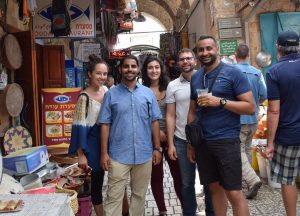 A city of constant changes and incredible history, Acre intrigues its visitors with remnants of crusader, Muslim and Ottoman conquerors. The city nowadays has a much calmer aura, with its charming seashore and marina lying just outside the Old City and its white-walled market. The delegates spent time touring the old city market and learning about the commercial significance of the area. Thanks to its proximity to Lebanon and Syria, Acre has historically been a city of trading and commercial importance. In Haifa, the delegates took in the sights and smells of the beautiful Baha’i Gardens, enjoying the panoramic view of the city, of the Galilee Hills, and of the Mediterranean Sea. To top off the day, the delegates jumped in the Mediterranean Sea off the coastline of Jaffa, formally known to be the cultural capital and largest city in Historic Palestine. The trip to these northern cities was a highlight for the delegates, as they were able to experience people living together in harmony as well as the land’s rich beauty and history.
A city of constant changes and incredible history, Acre intrigues its visitors with remnants of crusader, Muslim and Ottoman conquerors. The city nowadays has a much calmer aura, with its charming seashore and marina lying just outside the Old City and its white-walled market. The delegates spent time touring the old city market and learning about the commercial significance of the area. Thanks to its proximity to Lebanon and Syria, Acre has historically been a city of trading and commercial importance. In Haifa, the delegates took in the sights and smells of the beautiful Baha’i Gardens, enjoying the panoramic view of the city, of the Galilee Hills, and of the Mediterranean Sea. To top off the day, the delegates jumped in the Mediterranean Sea off the coastline of Jaffa, formally known to be the cultural capital and largest city in Historic Palestine. The trip to these northern cities was a highlight for the delegates, as they were able to experience people living together in harmony as well as the land’s rich beauty and history.
“My favorite city still remains Haifa. Apart from the natural beauty of the land and sea, the people’s resilience and inner beauty is the most impressive. There was a sense of calmness throughout the area that I had been longing to see.” — Leena B, U.S.
HE Dr. Hanan Ashrawi Presents Keys of Return to the 2016 Delegation
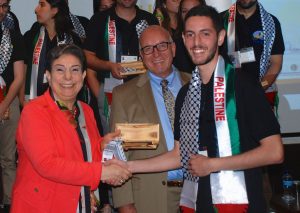 The delegates were honored to receive their personalized Keys of Return from HE Dr. Hanan Ashrawi at the 5th Annual Palestinian Diaspora Conference. When the Palestinian refugees left their homes in 1948 and 1967, they took their keys with them in the belief that their return was imminent. Over 60 years have passed and their numbers have multiplied to 7 million around the globe. The keys have been passed on from generation to generation as a keepsake—a memory of their lost homes and a lasting symbol of their anticipated return. In her speech, Dr. Ashrawi, who serves on the KTH Advisory Board, congratulated both HCEF for their outstanding work and commended them for creating a space for the collective Palestinian experience. She encouraged the delegates to remain steadfast by returning to and investing in Palestine: “Palestinian exiles and immigrants are still part of the Palestinian reality. We want you to engage in the future of Palestine. You can be our light and our voice throughout the world.” The delegates were encouraged by her words and accepted the keys as symbols and reminders of their commitment to their homeland.
The delegates were honored to receive their personalized Keys of Return from HE Dr. Hanan Ashrawi at the 5th Annual Palestinian Diaspora Conference. When the Palestinian refugees left their homes in 1948 and 1967, they took their keys with them in the belief that their return was imminent. Over 60 years have passed and their numbers have multiplied to 7 million around the globe. The keys have been passed on from generation to generation as a keepsake—a memory of their lost homes and a lasting symbol of their anticipated return. In her speech, Dr. Ashrawi, who serves on the KTH Advisory Board, congratulated both HCEF for their outstanding work and commended them for creating a space for the collective Palestinian experience. She encouraged the delegates to remain steadfast by returning to and investing in Palestine: “Palestinian exiles and immigrants are still part of the Palestinian reality. We want you to engage in the future of Palestine. You can be our light and our voice throughout the world.” The delegates were encouraged by her words and accepted the keys as symbols and reminders of their commitment to their homeland.
5th Annual Palestinian Diaspora Banquet and Conference
Theme of Unity Reigns at the 5th Annual Palestinian Diaspora Conference in Ramallah
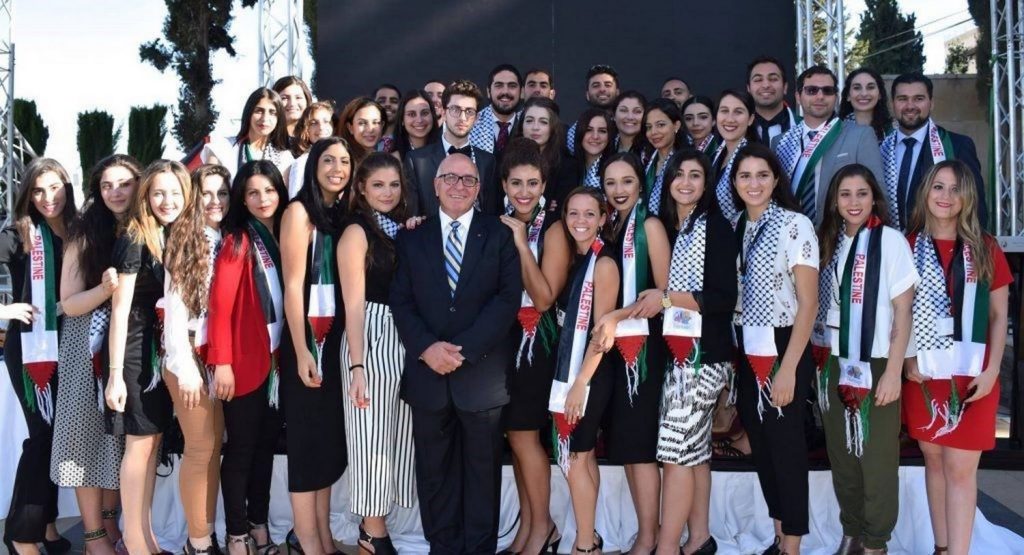 2016 Know Thy Heritage Delegation
2016 Know Thy Heritage Delegation
The 5th The Annual Palestinian Diaspora Conference in Ramallah, Palestine brought together diaspora dignitaries from around the world representing a wide array of sectors and institutions. Sir Rateb Rabie, President and CEO of HCEF, addressed the attendees in his opening remarks, referring to the Diaspora as a “sleeping giant” signifying the importance of the conference theme: “We are all one nation. We are all Palestinian.” The theme of unity between Palestinians in the diaspora and Palestinians in the homeland resounded throughout the two-day conference, with all esteemed speakers and panelists committed to building the State of Palestine as one people.
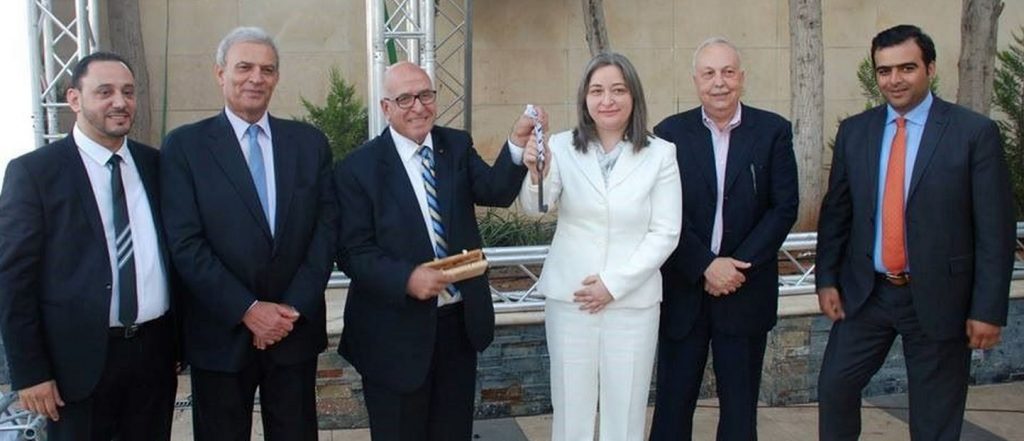
Dr. Siman Khoury, General Manager of Industrias Kabinchy and founder of the Palestinian Salvadorian Association, spoke about the role of the diaspora in Latin America, and how it must serve and lead by example. Ms. Lindsey Durand-Vibert, an Economic Development Team Leader at the Department for International Development (DFID) in Jerusalem, called on all present to further support diaspora backed economic initiatives: “Do not underestimate the role of the diaspora and private sectors for the success of this country. You are the ones who drive the innovation and hope for Palestine.” Most notably, HCEF signed an agreement with Maher Hamdan, Team Leader of the Palestinian Market Development Programme, and Adnan Samara, President of the Higher Council for Innovation and Excellence, to further develop business relations between Palestine and its diaspora. On the following day, Sir Rateb Rabie gave his opening remarks at the beginning of the General Conference, stating “We have the genes and blood of Palestinians. We have the minds and hearts of Palestinians. Let us meet together on equal footing so we can make a difference.” The opening ceremony included featured speakers: HE Mr. Taysir Khalid, Executive Member of the PLO, HE Ambassador Maen Areikat, Chief of the PLO Delegation to the United States, and Ms. Hanan Jarrar, Director of the Government Directorate of the Americas & the Caribbean. All three of them spoke about the importance of diaspora engagement as an essential key to the future of Palestine. In closing, HE Ambassador Areikat cited how the moral and political influence of the United States is so influential in the global political order: “For true change to come to Palestine, the United States needs to take a more favorable view towards the Palestinian people, and it is a special responsibility of Palestinians in the United States to help spread a more informed and balanced view of Palestine in their country.”
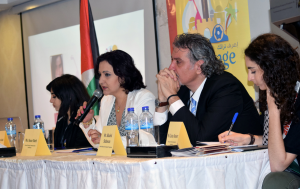 The first panel consisted of Palestinians working in media, as well as Mr. Khaled Shahwan from the United Nations Development Programme. Entitled “Palestinians in a World of Globalized Communications”, it examined how improved communications through social media, traditional media, and reciprocal visitation can maximize the potential for Diaspora networks to work together and create positive change in Palestine. Ms. Nour Odeh, CEO of Connect Strategic Communications Consultancy, and Ms. Jennine Abdul Khalik, a diaspora Palestinian journalist who writes for The Australian in Sydney, spoke about how diaspora communications could be developed and deepened, citing the successes that they have had as media professionals working for the Palestinian cause.
The first panel consisted of Palestinians working in media, as well as Mr. Khaled Shahwan from the United Nations Development Programme. Entitled “Palestinians in a World of Globalized Communications”, it examined how improved communications through social media, traditional media, and reciprocal visitation can maximize the potential for Diaspora networks to work together and create positive change in Palestine. Ms. Nour Odeh, CEO of Connect Strategic Communications Consultancy, and Ms. Jennine Abdul Khalik, a diaspora Palestinian journalist who writes for The Australian in Sydney, spoke about how diaspora communications could be developed and deepened, citing the successes that they have had as media professionals working for the Palestinian cause.
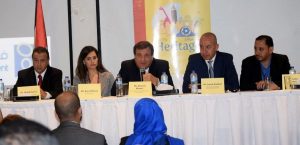 The second panel featured Mr. Jamal Haddad, the General Manager of Palestine for Development, Ms. Raya Sbitany, Head of Business Development at Bank of Palestine, Mr. Bassem Khoury, CEO of Dar Al-Shifa’a Pharmaceuticals, and Dr. Walid Zayed, a successful Palestinian-Panamanian lawyer, businessman, and scholar. The panel focused on the ways in which better connections with the Palestinian diaspora can support economic development and poverty reduction in Palestine. Through investment, initiatives to increase tourism, and joint business projects, the discussion offered possibilities for uniting Palestinians. Ms. Sbitany, commented “There is actually a Palestinian exchange! With 49 companies on the market, it is fully regulated and aligned with international standards. But, the diaspora just doesn’t know about it. We have a very energetic young population here who want to help, but it truly helps to get experience from abroad.”
The second panel featured Mr. Jamal Haddad, the General Manager of Palestine for Development, Ms. Raya Sbitany, Head of Business Development at Bank of Palestine, Mr. Bassem Khoury, CEO of Dar Al-Shifa’a Pharmaceuticals, and Dr. Walid Zayed, a successful Palestinian-Panamanian lawyer, businessman, and scholar. The panel focused on the ways in which better connections with the Palestinian diaspora can support economic development and poverty reduction in Palestine. Through investment, initiatives to increase tourism, and joint business projects, the discussion offered possibilities for uniting Palestinians. Ms. Sbitany, commented “There is actually a Palestinian exchange! With 49 companies on the market, it is fully regulated and aligned with international standards. But, the diaspora just doesn’t know about it. We have a very energetic young population here who want to help, but it truly helps to get experience from abroad.”
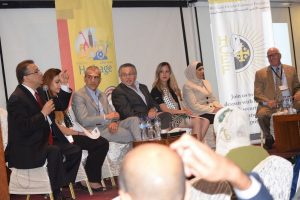 Sir Rateb Rabie moderated a roundtable discussion on how the Diaspora can work together to support Palestine’s growth and development. Dr. Assad Abdul Rahman, Executive Chairman of the Palestine International Institute, Mr. Mohammad Attoun, Trade & Investment Leader at the Palestinian Market Development Programme, Ms. Manal Farhan from the Ministry of Economy, and Dr. Walid Zayed all joined the discussion, offering their professional opinions and answering questions. Two Know Thy Heritage diaspora delegates, Hadeel Ibrahim, an Australian medical professional, and Annette Kafie, a Honduran international human rights student in Italy, joined the discussion. Ibrahim and Kafie spoke about the ways in which the homeland and Diaspora can fortify ties, and together with the other panelists, analyzed strategies for moving forward the economy, healthcare, and a human rights agenda.
Sir Rateb Rabie moderated a roundtable discussion on how the Diaspora can work together to support Palestine’s growth and development. Dr. Assad Abdul Rahman, Executive Chairman of the Palestine International Institute, Mr. Mohammad Attoun, Trade & Investment Leader at the Palestinian Market Development Programme, Ms. Manal Farhan from the Ministry of Economy, and Dr. Walid Zayed all joined the discussion, offering their professional opinions and answering questions. Two Know Thy Heritage diaspora delegates, Hadeel Ibrahim, an Australian medical professional, and Annette Kafie, a Honduran international human rights student in Italy, joined the discussion. Ibrahim and Kafie spoke about the ways in which the homeland and Diaspora can fortify ties, and together with the other panelists, analyzed strategies for moving forward the economy, healthcare, and a human rights agenda.
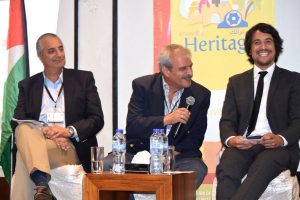 The final panel hosted three diaspora Palestinians from Latin America: Mr. Alex Cattan, President of the Arab Center in Concepción, Mr. Siman Khoury, General Manager/Owner of Industrias Kabinchy and Founding Member of the Palestinian-Salvadoran Association in El Salvador, and Mr. Roberto Kettlun, Professional Football Player for the West Bank Premier League. The panelists shared about how their personal journeys have inspired their work for Palestine. They spoke about the value of their Palestinian heritage and the importance of reconnecting with ones’ roots. Mr. Cattan, spoke about how he has used lessons learned over his many years in the corporate world to develop leadership skills that serve both Palestine and Chile, his country-of-residence. Mr. Khoury, offered a model for Palestinians living in the diaspora to give back to, and reconnect with, Palestine. Mr. Kettlun, spoke about how he used his passion for football to better serve the Palestinian cause: “My father and grandfather always told me I would never be able to return to Palestine, but through my love for football, I was able to return to my homeland and struggle for its cause. I encourage all of you to find your passion and use it as best you can to assist the Palestinian cause.”
The final panel hosted three diaspora Palestinians from Latin America: Mr. Alex Cattan, President of the Arab Center in Concepción, Mr. Siman Khoury, General Manager/Owner of Industrias Kabinchy and Founding Member of the Palestinian-Salvadoran Association in El Salvador, and Mr. Roberto Kettlun, Professional Football Player for the West Bank Premier League. The panelists shared about how their personal journeys have inspired their work for Palestine. They spoke about the value of their Palestinian heritage and the importance of reconnecting with ones’ roots. Mr. Cattan, spoke about how he has used lessons learned over his many years in the corporate world to develop leadership skills that serve both Palestine and Chile, his country-of-residence. Mr. Khoury, offered a model for Palestinians living in the diaspora to give back to, and reconnect with, Palestine. Mr. Kettlun, spoke about how he used his passion for football to better serve the Palestinian cause: “My father and grandfather always told me I would never be able to return to Palestine, but through my love for football, I was able to return to my homeland and struggle for its cause. I encourage all of you to find your passion and use it as best you can to assist the Palestinian cause.”














